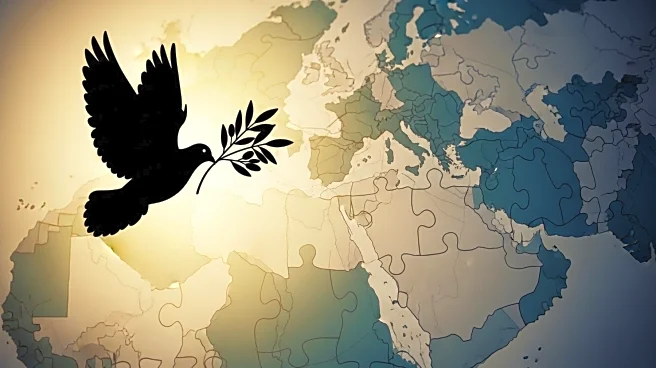What's Happening?
The Middle East has broadly welcomed a ceasefire in the Israel-Hamas conflict, marking a significant shift in regional dynamics. Iran, historically a key player in the 'Axis of Resistance,' finds itself increasingly isolated as its influence wanes. The ceasefire agreement, which includes the release of hostages and prisoners, reflects Tehran's diminishing clout following the unraveling of its alliance system. This development comes as President Trump visits the region, likely to be praised by Israel and Arab nations, while Iran struggles to recover from recent military setbacks.
Why It's Important?
The ceasefire signifies a potential realignment in Middle Eastern geopolitics, with Iran's reduced influence possibly altering power balances. This shift could impact U.S. foreign policy and military strategy, as Israeli military capacities may now focus on countering Iranian interests. The weakening of Iran's alliances could lead to increased stability in the region, benefiting countries seeking peace and economic recovery. However, Iran's response, whether through rebuilding its economy or escalating tensions, remains uncertain, posing challenges for international diplomacy.
What's Next?
Iran's future actions are critical, as it navigates its weakened position. The country may attempt to rebuild its economy or seek new alliances to regain influence. Meanwhile, the ceasefire agreement's implementation, including the release of hostages and prisoners, will be closely monitored by international stakeholders. President Trump's visit to the region could further shape diplomatic relations, with potential discussions on Iran's nuclear program and regional security. The long-term impact on Middle Eastern stability and U.S. foreign policy will depend on how these developments unfold.
Beyond the Headlines
The ceasefire highlights ethical and humanitarian concerns, particularly regarding the impact on civilians in Gaza and the broader region. The agreement raises questions about the future governance of Gaza and the reconstruction process, with Israel and Hamas holding differing views on troop withdrawal and disarmament. The situation underscores the complex interplay of regional politics, military strategy, and humanitarian needs, requiring careful navigation by all parties involved.










